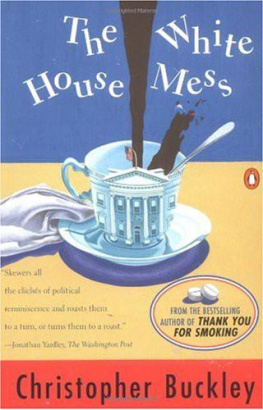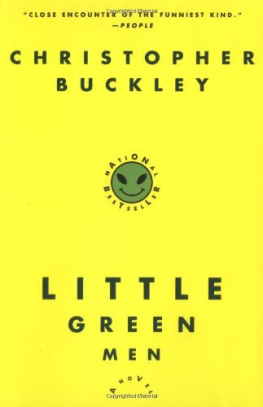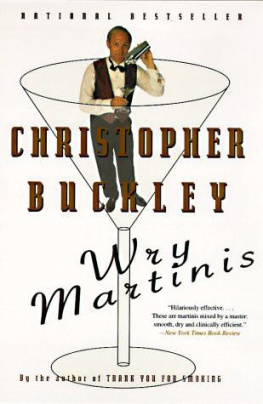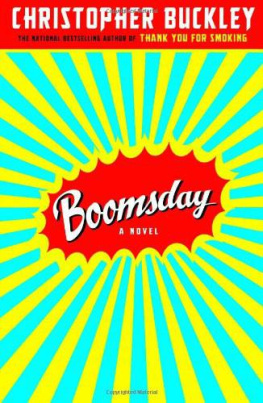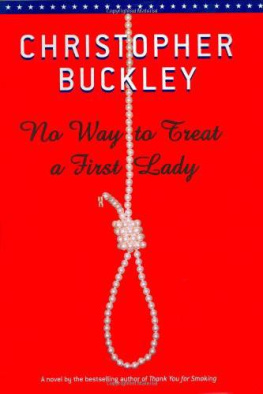Christopher Buckley - The White House Mess
Here you can read online Christopher Buckley - The White House Mess full text of the book (entire story) in english for free. Download pdf and epub, get meaning, cover and reviews about this ebook. year: 1995, publisher: Penguin (Non-Classics), genre: Detective and thriller. Description of the work, (preface) as well as reviews are available. Best literature library LitArk.com created for fans of good reading and offers a wide selection of genres:
Romance novel
Science fiction
Adventure
Detective
Science
History
Home and family
Prose
Art
Politics
Computer
Non-fiction
Religion
Business
Children
Humor
Choose a favorite category and find really read worthwhile books. Enjoy immersion in the world of imagination, feel the emotions of the characters or learn something new for yourself, make an fascinating discovery.
- Book:The White House Mess
- Author:
- Publisher:Penguin (Non-Classics)
- Genre:
- Year:1995
- Rating:4 / 5
- Favourites:Add to favourites
- Your mark:
- 80
- 1
- 2
- 3
- 4
- 5
The White House Mess: summary, description and annotation
We offer to read an annotation, description, summary or preface (depends on what the author of the book "The White House Mess" wrote himself). If you haven't found the necessary information about the book — write in the comments, we will try to find it.
The White House Mess — read online for free the complete book (whole text) full work
Below is the text of the book, divided by pages. System saving the place of the last page read, allows you to conveniently read the book "The White House Mess" online for free, without having to search again every time where you left off. Put a bookmark, and you can go to the page where you finished reading at any time.
Font size:
Interval:
Bookmark:
For my wife, with love
At 11:48 a.m. on Friday, January 20, 1989, the heavy iron gates of the White House grounds swung open and moments later the President-elect's motorcade drew to a halt beneath the North Portico. In accordance with custom, the President-elect and Mrs. Tucker were escorted inside, where they would escort President Reagan and the First Lady to the motorcade for the trip to Capitol Hill.
It was a clear and cold Washington winter day, a fine day for an inaugural ceremony. There was an air of excitement and history in the air. For the Tucker team, this was not the end of a twenty-two-month-long road, but the beginning of a dream.
Mike Feeley, the President-elect's press secretary, and I waited in our own limousine several Secret Service cars behind the President-elect's. Feeley filled the inside with so much cigarette smoke that I began to worry I might have a bronchospasm.
Ten minutes passed. Feeley began to fidget. Then I became concerned. Presidential movements are scheduled down to the minute. A delay like this, with the entire nation waiting, was unusual.
An advanceman in the front seat of the limousine pressed his earpiece to his ear, then said into the microphone clipped inside his shirtsleeve, "Echo One Tango. Say again, Headmaster?" He listened intently to the repeated message and turned to face me.
"Mr. Wadlough, Firebird wants you immediately in the Roosevelt Room." Firebird was President-elect Tucker's Secret Service code name.
"Christ," said Feeley, looking at his watch. "This is an outrage."
"Relax, Feels," I said merrily, for I was feeling very gay that morning. "It's probably just a photo op."
I was escorted through the West Lobby directly to the Roosevelt Room. The President-elect, Mrs. Tucker, and several Reagan officials and cabinet members who were to accompany the President up to Capitol Hill were clustered at the far end of the room. The looks on their faces were grave. The President-elect waved me over. As I approached, I was conscious of entering a scene charged with drama, though that may just have been the inset spot lighting.
"Herb," said the President-elect barely above a whisper, "we seem to have a situation here." He drew a deep breath. "The President won't leave."
I did not at first understand.
"I beg your pardon, sir?"
"His doctor's in with him now. They're talking about maybe giving him a shot of adrenaline."
During the transition President Reagan's inner circle had privately and delicately confided to me that their chief had been showing increasing signs of his advanced years. (He was at this point only weeks short of his seventy-eighth birthday.) The Defense Department had recently drawn up a contingency plan to provide, in their gruesome idiom, "command-chain continuity."
My immediate concern was less for the integrity of our nuclear response than for the 120,000-odd spectators, VIPs, media, security agents, air-traffic controllers (I had even arranged for landings and takeoffs from National Airport to be suspended during the President's inaugural speech), and others who were waiting for the start of an inaugural that was now threatening to be a logistical nightmare.
"Have you spoken to him?" I asked.
"Yes, I have," said the President-elect. "He told me his back was bothering him, that he was feeling tired, that it's cold outside, and that he just didn't feel like moving out today."
"Oh," I said, for I could think of nothing else to say.
"He was very nice about it. Hoped it wouldn't inconvenience me.
"I see. Did he say when he might feel like moving?"
"Yes. Spring."
"Spring."
I had spent weeks drawing up contingency plans for everything, including the disposal of 1,800 pounds of horse manure that would be "processed" during the parade. I had not anticipated this.
Mrs. Reagan and Jim Knott, President Reagan's deputy chief of staff, were in the Oval Office trying to persuade him to get dressed. Apparently he had not changed out of his pajamas that morning.
President-elect Tucker turned to the cluster of officials and said softly, "Gentlemen, perhaps we should discuss this in private. Why don't we convene in the Situation Room?"
As we all walked down to the ground floor of the West Wing, Defense Secretary R. Hannibal Bowditch grumbled quite audibly, "Acting like he's already President."
A fine sentiment, I thought. The transition had been a difficult one.
Eight of us, a mix of Reagan and Tucker officials, took our places around the burled-white-ash conference table in the Situation Room. The room has the feel of the inside of a bank vault. A hissing sound emanates from the floor that makes the room impenetrable to electronic eavesdropping. Every time the door opens, a red sign lights up red and flashes: ROOM STATUS: NOT SECURE FOR SENSITIVE DISCUSSION. There were seven phones in front of us, six white and one red.
Steady, Wadlougb, I said to myself. I confess that red phones make me nervous.
Apart from the President-elect and myself, the others were all Reagan inner circle: Bowditch; Knott; Mortimer "Skip" Billington of the National Security Council; Virgil "The Butcher" Hooper, Office of Management and Budget; Attorney General Atticus Simpson; Commander William Crimmins, the President's physician. Vice President Bush had injured himself playing racquetball the day before and was still in the hospital. I rather missed Bush. He would have brought the average age of those assembled down considerably.
It was now 12:06 p.m.
"Gentlemen," began the President-elect, "I know this is awkward, but I think we'd better try to find a solution quickly. There are a lot of people waiting for us up there. You know the President much better than I do. Do you have any suggestions?"
Bowditch volunteered his. "Go to DefCon Three."
Def(ense)Con(dition) Two is the designation for a high-level nuclear alert. The lowest is DefCon Five; the highest is DefCon One. DefCon Two puts U.S. forces worldwide on a virtual war footing. The Secretary's suggestion was thus, well, surprising.
The President-elect said in what I thought was a very reasonable tone of voice, "I see. The reason being?"
"Mr. President-elect," said Bowditch heavily, "we have here a situation of extreme"he lingered on the word"criticality. Never during my four years at Defense have I moved higher than [DefCon] Four."
"For which we are all extremely grateful, sir," interjected the President-elect.
Bowditch furrowed his brows. "This speaks to the President's and my temperance, despite the more"he cleared his throat noisily"intemperate charges made during the campaign."
Here it comes, I thought.
"Your friends in Moscow"
"My what?" said Tucker. It was an interesting contrast, the forty-eight-year-old President-elect and the hoary Bowditch.
Bowditch let the question pass. He then launched into a harangue the point of whichas I understood itwas that the Soviet Union was at this moment undoubtedly about to take advantage of our present dilemma. When the President-elect asked him why he thought this was the case, Bowditch merely harrumphed that it was "instinct" and then rambled for some minutes about his lengthy career of public service. It was necessary to interrupt this flow of words, which seemed greatly to annoy him.
Faced with this rather awkward and deteriorating situation, President-elect Tucker turned to Mr. Billington, the seventy-nine-year-old director of the National Security Council, and asked him for his assessment. Unfortunately, Billington had not been following the discussion, owing to his hearing problem.
The President-elect rubbed his forehead with the tips of his fingers. "That's all right, sir," he said wearily.
Font size:
Interval:
Bookmark:
Similar books «The White House Mess»
Look at similar books to The White House Mess. We have selected literature similar in name and meaning in the hope of providing readers with more options to find new, interesting, not yet read works.
Discussion, reviews of the book The White House Mess and just readers' own opinions. Leave your comments, write what you think about the work, its meaning or the main characters. Specify what exactly you liked and what you didn't like, and why you think so.

